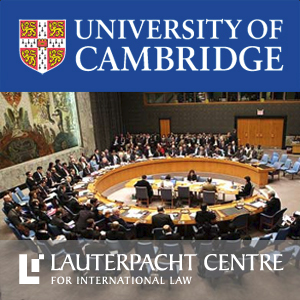'Stability and Change in Times of Fragmentation. The Limits of Pacta sunt Servanda revisited' by Professor Christina Binder
Duration: 40 mins 10 secs
Share this media item:
Embed this media item:
Embed this media item:
About this item

| Description: |
Lauterpacht Centre for International Law (LCIL), University of Cambridge hosts a regular Friday lunchtime lecture series on key areas of International Law. Previous subjects have included UN peacekeeping operations, the advisory jurisdiction of the International Court of Justice, the crime of aggression, whaling, children and military tribunals, and theories and practices for proving individual responsibility criminal responsibility for genocide and crimes against humanity.
This lecture, entitled 'Stability and Change in Times of Fragmentation: the limits of Pacta sunt Servanda revisited', was delivered at the Lauterpacht Centre on Friday 28 February 2014 by Professor Christina Binder, Associate Professor of International Law at the Department of European, International and Comparative Law of the University of Vienna. Please note, the question and answer sections of LCIL lectures are omitted to facilitate a free and frank discussion with participants. For more information about the series, please see the Lauterpacht Centre website at http://www.lcil.cam.ac.uk |
|---|
| Created: | 2014-03-06 15:08 |
|---|---|
| Collection: | LCIL International Law Seminar Series MOVED |
| Publisher: | University of Cambridge |
| Copyright: | University of Cambridge |
| Language: | eng (English) |
| Keywords: | international law; pacta sunt servanda; law of treaties; force majeure; state responsibility; |
| Abstract: | Stability versus change is one of the fundamental debates of the law of treaties. The limits of pacta sunt servanda – under which conditions a state may derogate from treaty obligations when circumstances change – appears as a constant throughout the history of international law. This presentation examines the limits of pacta sunt servanda in times of fragmentation. It shows that the mechanisms of general international law – supervening impossibility of performance and fundamental change of circumstances (Articles 61 and 62 VCLT) in the law of treaties and force majeure and the state of necessity (Articles 23 and 25 of the ILC Articles on State Responsibility) in the law of state responsibility provide only insufficient means to accommodate change. Against that background, derogation is examined in specific treaty regimes, including international human rights law, the law of the sea, and international investment law.
The presentation summarizes the results of Professor Binder's book 'Die Grenzen der Vertragstreue im Völkerrecht' (Springer 2013) as well as of an article in the 25/4 Leiden Journal of International Law 2012, p. 909-934. |
|---|---|

